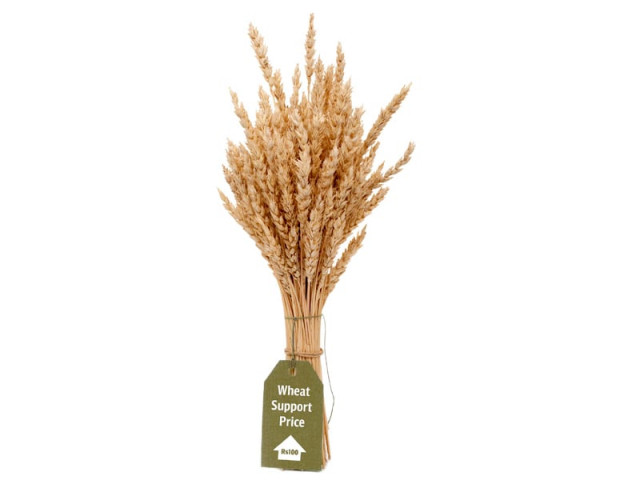Helping hand: Wheat support price increased by 10 per cent
Decision does not apply to provinces, Punjab criticises rate hike.

The government on Wednesday increased wheat support price for new crop by 10.5 per cent without taking provinces into confidence and said the new price would cover the increased cost of production.
“A meeting, presided over by Prime Minister Yousaf Raza Gilani, decided to fix wheat support price for next year at Rs1,050 per 40 kg for (procurement) by Pakistan Agricultural Storage and Supplies Corporation,” announced the Prime Minister’s House. Earlier, the price was Rs950 per 40 kg.
An official of the PM House said the decision would not be applicable to provinces as agriculture had become a provincial subject under the 18th Constitutional Amendment.
Unlike the past, when such decisions were taken by the Economic Coordination Committee (ECC) of the cabinet, this time the decision came from the PM office. The meeting was largely attended by ministers having agricultural background.
Some legislatures criticised the central government’s meddling in provincial affairs, saying the subject of agriculture had been devolved to the provinces.
“The decision is a clear violation of the Constitution and the federal government should have taken the matter to the Council of Common Interests,” said Senator Professor Khursheed Ahmad, a member of the parliamentary committee that had worked on the 18th amendment.
He said instead of increasing the wheat price the government should have reduced input prices, particularly that of urea.
The decision is likely to lead to an increase in prices of essential commodities, say independent economists. This is the third increase in wheat price since the current government took over in March 2008.
“According to empirical evidence, a 10 per cent increase in wheat support price results in a three per cent increase in inflation measured by the Consumer Price Index,” said economist Dr Ashfaque Hasan Khan.
“Punjab had proposed to the federal government to constitute a technical committee of provinces to resolve the wheat price issue and also sought a reduction in sales tax on urea to make inputs cheaper,” said Irfan Elahi, Secretary Food Department Punjab.
Elahi did not say whether Punjab would match the price. The provincial government had fixed procurement target at four million tons for the season, he added.
“With the increase in support price, the Peoples Party government has made an attempt to snatch food from the poor,” said Senator Parvez Rashid, the spokesman for the Punjab government.
When the government took over in 2008, chapati (bread) was sold at Rs2 and now after the fresh increase in wheat price, the rate may shot up to Rs6, he said.
Rashid said the Punjab government would take a decision on any price increase after deliberations and keeping in view the buyers and not the sellers of the commodity.
Fertiliser imports
The PM House said participants of the meeting decided that the shortage of fertiliser, estimated at one million tons for Rabi crop season, would be met through expeditious imports. It also agreed that the subsidy of Rs25 billion on import of fertiliser should reach common growers.
Fertiliser will be imported in December, the highest consumption period when wheat crop is cultivated.
The prime minister also constituted a committee comprising federal ministers for finance and industries to remove bottlenecks in the distribution of fertiliser and disparity between imported and domestic urea prices. The committee will also ensure elimination of black marketing, profiteering and hoarding by middlemen.
Published in The Express Tribune, November 24th, 2011.


















COMMENTS
Comments are moderated and generally will be posted if they are on-topic and not abusive.
For more information, please see our Comments FAQ